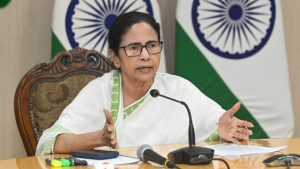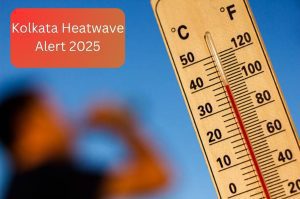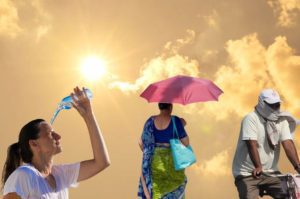West Bengal Advances Summer Vacation to April 30: In a significant and timely move aimed at prioritizing student health and well-being, the Government of West Bengal has officially announced that summer vacation for all government, government-aided, and sponsored schools across the state will begin early this year, from April 30, 2025. This proactive measure comes in response to a steep rise in temperatures and intense humidity levels sweeping across several regions of West Bengal, including Kolkata, Howrah, Hooghly, Purulia, Bankura, and parts of North and South 24 Parganas.
Traditionally, summer vacations in West Bengal’s school calendar commence in the second or third week of May, aligning with climatic patterns and academic schedules. However, this year, with heatwave-like conditions persisting for days and temperatures crossing 40 degrees Celsius in many areas, the state administration has decided to prioritize the health of young students by advancing the break by nearly two weeks.
Summer Vacation to April 30: CM Mamata Banerjee’s Statement
Chief Minister Mamata Banerjee, known for her hands-on governance style, made the announcement following a high-level review meeting that included officials from the Education Department, Disaster Management, Health, and Meteorology departments. She said:
“The temperature is soaring, and there is no prediction of rain. We have received feedback from districts that students are finding it extremely difficult to attend school in this weather. Considering the safety and health of our children, we have decided that summer vacation in state schools will start from April 30, 2025.”

She also appealed to private schools to follow suit, though the decision for non-government institutions would rest with their respective management committees.
Meteorological Warning: No Respite from Heat Soon – Summer Vacation to April 30
The India Meteorological Department (IMD) has predicted that no significant rainfall is expected for the next 7–10 days in southern Bengal. Temperatures in districts like Bankura, Purulia, Jhargram, and Birbhum have crossed 43°C, with heat index values (combining temperature and humidity) making conditions feel even worse.
Meteorologists noted that this year’s summer onset has been particularly intense and prolonged, likely exacerbated by climate change, reduced tree cover in urban areas, and increased surface heating due to infrastructure development. Kolkata recorded one of its highest April temperatures in over a decade earlier this week.
Summer Vacation to April 30: Pediatricians and Health Experts Laud the Decision
Several child health experts have praised the government’s move. Dr. Anirban Sinha, a pediatrician at a leading Kolkata hospital, remarked:
“Children are particularly susceptible to dehydration, heat exhaustion, and sunstroke. Prolonged exposure to high temperatures, especially during commutes or outdoor activities, can have severe implications. An early summer break is not just logical—it’s essential.”
Public health organizations such as the Indian Academy of Pediatrics (IAP) and child rights NGOs echoed similar sentiments, urging other states facing similar heatwave conditions to consider early closures.
Summer Vacation to April 30: Schools Adjust Academic Calendar
The Education Department has issued a circular requesting school heads to adjust internal exams, assignments, and syllabus coverage to accommodate the early break. Teachers have been asked to send home assignments or utilize online platforms (where feasible) to maintain continuity.


A senior official remarked:
“This decision was taken after consulting educationists. We’re confident that schools will adapt their curriculum plans. Our first priority is student health, but we are also mindful of academic goals.”
In rural areas with limited digital infrastructure, schools are distributing homework sheets and printed study materials to ensure learning does not come to a complete halt.
Parents Breathe a Sigh of Relief
Parents, especially in districts where schools start as early as 6:30 AM, have welcomed the decision. Mrs. Anjali Dutta, a parent from Asansol, said:
“We were really worried about sending our kids to school in this heat. Even at 7 in the morning, the sun feels harsh. This vacation is a relief.”
Parents’ associations are urging private and international schools to follow the state government’s lead. Some private institutions have already started discussions to reschedule their vacation periods.
Summer Vacation to April 30: Impact on Private Schools
While the government directive covers only state-run and aided schools, many private and international schools are independently evaluating the feasibility of an early summer vacation. Schools affiliated with CBSE and ICSE boards often follow a different academic calendar but have been encouraged to consider the health of their students.
The Association of Private Schools in Bengal has stated that a consensus is being developed, and a decision will be made within days based on temperature forecasts and parental input.
Summer Vacation to April 30: Climate Experts Weigh In
Climate scientists and environmentalists argue that this incident is part of a broader pattern of climate-induced disruptions that will affect multiple sectors, including education.
Dr. Rina Mukherjee, a climate researcher, noted:
“This is just the beginning. Schools, offices, and transportation systems will all need to adopt new models to deal with increasingly erratic weather patterns. Heatwaves will become more frequent and intense.”
Summer Vacation to April 30: Comparisons with Other States
West Bengal is not alone. Other states like Odisha, Jharkhand, and Chhattisgarh have also advanced summer vacations or altered school timings due to heat. In Odisha, school hours were shifted to early mornings as temperatures breached 44°C in several districts.
The coordinated response across states underlines the severity of the climate challenge and the necessity for heat action plans at state and district levels.
Historical Trends of Heatwaves in West Bengal
West Bengal has experienced a gradual rise in pre-monsoon temperatures over the past decade. According to data from IMD:
- The average April temperature has increased by 1.2°C in the last 10 years.
- The number of heatwave days (above 40°C) has doubled.
- Urban areas report higher discomfort indices due to humidity and heat absorption by buildings.
These trends are prompting education planners to reassess school infrastructure, including availability of fans, water, and shaded play areas.
Student Voices: What Children Say About the Heat
Children themselves are also feeling the effects. In interviews conducted in Kolkata and Malda, students reported difficulty concentrating in classrooms, headaches during travel, and fatigue. A student from Class 7 at a government school in Hooghly said:
“We sweat a lot in the classroom. The fans don’t help much. Sometimes we feel dizzy. I’m happy we will get holidays early.”
Summer Vacation to April 30: Role of School Infrastructure in Climate Adaptation
Many government schools in West Bengal operate in buildings lacking proper ventilation, cooling systems, or clean water supply. Experts are calling for investment in climate-resilient infrastructure:
- Heat-reflective roofs
- Shaded courtyards
- Solar-powered fans
- Rainwater harvesting for school gardens
Implementing such features could significantly improve student comfort and reduce the need for emergency closures.
Rising Temperatures Prompt Government Action
Recent weather reports from the India Meteorological Department (IMD) have recorded alarming temperatures across several districts in West Bengal. Kolkata recently registered a temperature of 34.4 degrees Celsius, and the IMD has forecasted an upward trend in the coming days. Districts like Bankura, Purulia, Jhargram, East and West Medinipur, Howrah, Hooghly, and both North and South 24 Parganas are witnessing extreme heat, with minimal signs of relief from rainfall or wind activity.
Many schools, especially those in rural and semi-urban pockets with limited infrastructure, have reported difficulties in managing students in such harsh conditions. Teachers and school authorities have flagged concerns over the rising number of students complaining of heat exhaustion, dehydration, and other related ailments. In some cases, district administrations had requested changes in school timings or temporary closures until temperatures normalize.
Chief Minister Mamata Banerjee’s Proactive Measures
Chief Minister Mamata Banerjee acknowledged the severity of the situation and emphasized that student safety must remain paramount. During her media address, she said, “The heat is becoming unbearable. The children are getting sick. We have taken this decision keeping their well-being in mind.”
The Chief Minister also added that the Education Department will issue a formal notification and provide necessary instructions to schools for managing the early break. She assured that school authorities will be supported in ensuring a smooth transition and that academic schedules will be adjusted accordingly to avoid learning loss.
Impact on School Curriculum and Examinations
While the announcement has been largely welcomed, it has also raised questions about its impact on school curriculum completion and scheduled examinations. According to senior officials from the West Bengal Board of Secondary Education (WBBSE) and the West Bengal Council of Higher Secondary Education (WBCHSE), efforts are being made to adjust academic calendars.
“Teachers will be advised to conduct revisions and pending lessons once schools reopen. We’re looking into scheduling compensatory classes post-vacation. The main goal is to ensure both academic continuity and student health,” said a senior education official.
Private schools and central institutions such as Kendriya Vidyalayas may choose to follow their own calendars, but many are also expected to align with the state government’s decision, particularly in heatwave-affected regions.
Summer Vacation to April 30: Health Experts Support the Decision
Child health specialists and pediatricians have supported the move, warning that children are particularly vulnerable to heat-related illnesses. Dr. Partha Basu, a pediatrician at a Kolkata-based hospital, stated, “Children’s thermoregulation systems are not fully developed, making them susceptible to heat strokes, cramps, and dehydration. An early vacation is a sensible step.”
Medical professionals also suggest that schools and parents continue to monitor children’s hydration levels, encourage the use of caps or umbrellas, and avoid outdoor exposure during peak hours. Several advisories are expected to be issued in the coming days by the Health and Family Welfare Department.
Summer Vacation to April 30: Reactions from Parents and Teachers
Parents across the state have welcomed the government’s decision. Many had been voicing concerns over their children’s discomfort during long school hours in this weather. “My daughter was coming home exhausted and sick every day. We were worried, and now we’re relieved,” said Soma Das, a parent from Barrackpore.
Teachers and school principals have also largely endorsed the decision. However, they have called for better infrastructural readiness in the future to deal with climate emergencies. Many schools lack proper ventilation, fans, or shaded areas for recreation, making it increasingly difficult to conduct classes in extreme heat.
Summer Vacation to April 30: Broader Climate Concerns
Environmentalists and educationists have noted that this early summer vacation announcement is part of a larger issue—climate change. India, particularly states like West Bengal, is witnessing the effects of global warming more frequently, with unseasonal rains, extended summers, and rising average temperatures.


“This is a wake-up call,” said Anuradha Sen, an environmental researcher. “We need climate-resilient infrastructure in schools and a policy framework that anticipates such weather extremities.”
The situation has also reignited discussions about implementing alternate school calendars that factor in climate data and create contingency plans for weather-related disruptions.
Summer Vacation to April 30: Role of Digital Learning in Adverse Weather Conditions
In light of extended breaks and the unpredictability of in-person classes, education technology experts are urging the state to invest in hybrid or digital learning platforms. While urban schools have already embraced online teaching methods post-COVID-19, rural institutions still face challenges in connectivity and accessibility.
Some educators propose that during such unscheduled breaks, students could be engaged through mobile-based learning tools, community learning centers, or pre-recorded video content provided by the state education board.
Looking Ahead: Preparing for a Safe Return
The state government has promised to monitor the weather closely and determine the appropriate time for schools to reopen. Depending on the weather situation post-May 31, further advisories will be issued. Schools are expected to implement heat-mitigation strategies upon reopening, such as staggered timings, hydration breaks, and alternative uniform codes to allow lighter clothing.
In conclusion, the decision to advance the summer vacation in West Bengal from April 30, 2025, reflects a thoughtful and student-centric approach to education amidst climatic challenges. While it temporarily disrupts academic flow, it prioritizes safety and well-being—an imperative in today’s climate reality.


What Comes Next: Preparing for Reopening
The West Bengal government has asked schools to monitor weather conditions before reopening in June 2025. If the heatwave persists, further adjustments may be made. The Education Department is also considering issuing guidelines on modified school hours and mandatory health checks for children.


For Further Reading:
Also read: Home | Channel 6 Network – Latest News, Breaking Updates: Politics, Business, Tech & More

